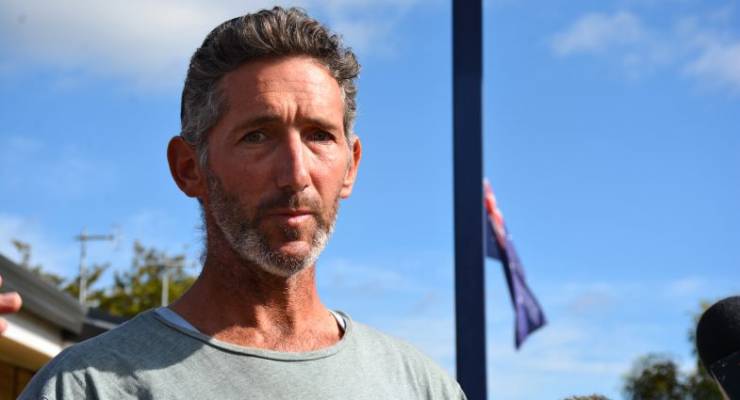
Aaron Cockman, the father of four children killed near Margaret River, WA.
Imagine being in an Australian newsroom last Friday. News breaks of several bodies discovered at an idyllic rural property in WA. Editors throwing away the playbook for the day, journalists jumping in company cars and on flights to a town outside Margaret River. Most would know no one in the town, have very little context for the crimes and are told only what the police are willing to reveal. They also face pressure to capture the biggest mass shooting in Australia since the Port Arthur Massacre.
All of this goes to explain the coverage of the tragic deaths of the Miles family at the hand of grandfather Peter. The story is only a few days old, but already contradictory stories are being told.
As of Monday morning, the primary account is coming from Aaron Cockman, the ex-husband of the deceased mother in the family, Katrina Miles.

Cockman, we are told, knows the mindset of alleged murderer Peter Miles. Cockman, we are told, waited patiently on Sunday until every last camera operator and journalist assembled for the press conference before he addressed the pack, to the surprise of police.
He explained Peter Miles’ “heartache” at a son’s suicide and his more recent devastation at another child’s health problems. “Peter didn’t snap,” he said. “He’s thought this through. I think he’s been thinking this through for a long time. All the kids died peacefully in their beds.”
Cockman’s words are quoted fulsomely on the ABC, the Fairfax outlets, The West Australian, The Australian and virtually every other outlet. Cockman’s full statement is put online.
Is this the only story?
The forthcoming grieving father is a new role for Cockman in the story of this story. Earlier reports portrayed him in a completely different light. A report in The Australian detailed his alleged harassment of Katrina Miles in recent days, his dissatisfaction with their breakup and her decision to home school their four autistic children:
The massacre came after weeks of tension between Ms Miles and her ex-husband Aaron Cockman. On the morning of April 23, Ms Miles told friends on Facebook that Mr Cockman had parked overnight outside her property and remained there after being asked to leave. “Despite four years passing … him agreeing to our kids being homeschooled … my ex does not stop stalking and harassing me,” she wrote.
‘I’ve been told to not cause conflict in front of my kids but my family shouldn’t have to spend their Sunday night dealing with this. He stayed overnight, parked on the side of the road, opposite our top corner boundary; spoke to my kids via phone about 5pm to inform us, he was asked to leave but was still there at 7am. I am not an isolated young wife anymore. If anyone sees his van parked on Osmington Rd please call the ranger to move him on.’
In her Facebook message, Ms Miles posted a string of text messages she received from Mr Cockman the previous evening. Among them, he said: ‘Can I talk to the kids’; ‘Or are you to (sic) messed up’; ‘I will be here every night’.
None of these details were prominent in the Monday morning coverage.
How did the media pivot so quickly? How did they turn a man who allegedly stalked his ex-wife into the most important commentator on the death of that same woman and her entire family?
For most of the over-worked, under-resourced reporters sent out on stories like this, the competition is fierce and the information vacuum is vast. A small town overrun with journalists will see some locals soak up the national attention. Initial impressions rarely capture the nuances, but a journalist’s job must go on. As Janet Malcolm writes in The Journalist and the Murderer:
Unlike other relationships that have a purpose beyond themselves and are clearly delineated as such (dentist-patient, lawyer-client, teacher-student), the writer-subject relationship seems to depend for its life on a kind of fuzziness and murkiness, if not utter covertness, of purpose. If everybody put his cards on the table, the game would be over. The journalist must do his work in a kind of deliberately induced state of moral anarchy.
A potent combination of factors has left us with Cockburn’s version of events dominating the news cycle. That account will last at least until the likely coronial inquest and potentially beyond. Removing the moral murkiness remains as ever, up to us, the readers.
You can reach Lifeline on 13 11 14. If you or someone you know is impacted by domestic or family violence, call 1800RESPECT on 1800 737 732 or visit 1800RESPECT.org.au. In an emergency, call 000.








Last para: “… until the case goes to trial”. What trial?
Cockman’s references to Jehovah had me worried.
I agree. If Peter Miles shot his wife, daughter, four grandchildren and then himself who will face trial? At most there will be a coroner’s court inquiry.
Cockman’s story may gloss over his own behaviour but that does not make his version of what happened on the morning of May 11th any less reliable.
Same thought as you MJM – surely to the coroner, not the magistrate.
Also, I question the use of “fulsomely” which generally means “abundant and cloying praise”. “Extensively” would have been a better adjective.
Thanks for this comment — I’ve changed the reference as it will likely be a coronial enquiry.
It is a Coroninquest when a death has occurred, not enquiry.
..a Coroner’s inquest.
But Mr Miles placed an emergency call notifying the police of his crimes. You are apparently suggesting the possibility that Mr Cockman killed his wife and kids, without leaving any forensic evidence of his involvement, then went to the house, killed Mr Mile’s wife and then managed to coerce him at gun point to call 000 to report the crimes without raising any suspicion during the phone call that he was under duress, and again without leaving any forensic evidence he was there at the scene or held the weapon. He probably also has a solid alibi otherwise he probably would be a suspect by now, given the evidence on FB and elsewhere that he was stalking and harassing his ex. Sorry, but I find this article premature and irresponsible.
The police have not explicity said who made the call and we are forbidden to hear it.
A person can be a suspect without police declaring it. Cases can take years.
Well you better let The ABC know, because I read an article where they clearly outlined the polices suspected order of events of the deaths and alleged actions of Miles including at which point he made the call to police.
Oh Sherlock.
Best learn a thing or two about p o l i c i n g.
They may have solved the case, they may have new evidence come to light. But with all these live-and-die by the media sleuths we may never have a discussion.
“A potent combination of factors has left us with … [whose?] version of events ?
Thanks for this piece. I recalled hearing comments from a neighbour to the effect that she could understand the father being responsible for this tragedy but not the grandfather. Then suddenly, the father is the hero. No doubt he is in pain but as you rightly say, we will need to wait for the coroner to learn more about the circumstances. This tragedy seems to defy what we know about keeping families safe – community support and connectedness, licensed firearms and a mother prepared to speak up when she feels threatened. Where to from here?
I tuned out after the first reports knowing how we were going to be subjected to endless, speculative ramblings from baby
journos dispatched by their masters to hang around for soundbites and photo ops and non insights from neighbours. This awful situation should be left alone until some actual facts emerge. That won’t happen because of the old saw “if it bleeds it leads”. Just stfu fits nicely.